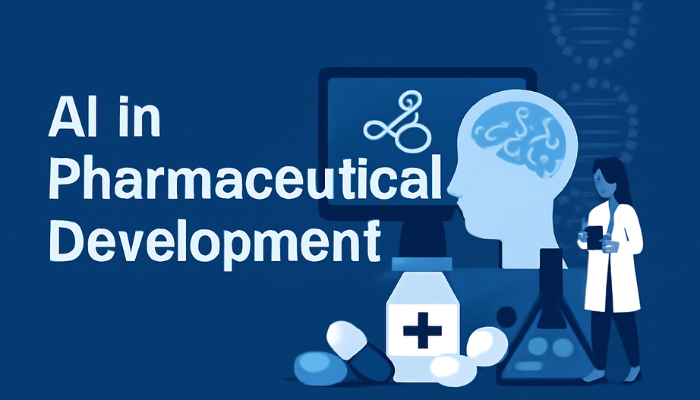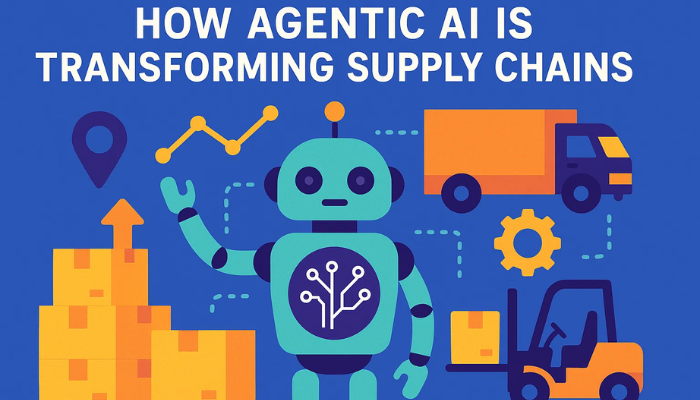Is your pharmaceutical development keeping up with today’s fast-changing market?
AI is changing the way the pharmaceutical industry works, helping companies speed up drug discovery, improve treatments, and cut down development time. But how can AI be used in your systems, apps, and software to make a real difference?
By using AI tools and data analysis, your team can make smarter decisions, personalize treatments, and improve the accuracy of clinical trials. AI can easily fit into your existing processes, helping you move faster and work more efficiently.
This blog will show you how software solutions can bring AI into pharmaceutical development and help your business innovate and stay ahead in the market.
How AI Works in the Pharmaceutical Industry
AI is reshaping how pharmaceutical companies conduct research, develop drugs, and bring treatments to market. Here’s a closer look at how AI is being used across various stages of pharmaceutical development:
1. Drug Discovery
Drug discovery involves identifying promising compounds that could become effective treatments. AI accelerates this process by analyzing large datasets to predict how molecules will interact with diseases.
- Analyzes vast biological data to uncover novel drug targets that might otherwise be missed.
- Predicts molecular interactions with diseases using machine learning models, speeding up the identification of potential drug candidates.
- Reduces time and cost by automating the screening of compounds and focusing on the most promising ones.
- Designs new molecules using generative algorithms that optimize their properties for efficacy and safety.
- Identifies biomarkers that are crucial in developing more precise treatments.
2. Clinical Trials
Clinical trials are essential for testing new drugs, but they’re also costly and time-consuming. AI helps optimize trial designs and improve patient recruitment.
- AI analyzes patient data to identify ideal participants based on medical history, genetic makeup, and other factors.
- Helps design smarter trial protocols by predicting which patient groups will benefit the most.
- Reduces patient recruitment time by analyzing large datasets and identifying suitable candidates more quickly.
- Monitors ongoing trials by analyzing real-time data to spot issues early and make adjustments.
- AI can predict patient responses to treatment based on their genetic profile, improving the chances of trial success.
- Automates administrative tasks such as data collection, reducing the workload on trial managers.
3. Personalized Medicine
Personalized medicine focuses on creating tailored treatment plans based on an individual’s genetic makeup and health data. AI plays a key role in making this possible.
- Analyzes genetic data to identify individual variations in drug metabolism and response.
- Optimizes treatment plans by predicting the most effective therapies based on a patient’s unique genetic profile.
- Reduces side effects by customizing dosages and drug combinations based on patient genetics.
- AI can suggest personalized drug combinations that increase efficacy and minimize risks.
4. Drug Repurposing
AI can also help find new uses for existing drugs. By analyzing existing drug databases, AI can identify off-label uses for medications that were developed for other conditions.
- Scans existing databases to match drugs with new disease targets based on molecular similarities.
- Helps identify off-label uses that could benefit patients, speeding up the introduction of treatments.
- Reduces development time by testing existing drugs instead of starting from scratch.
- AI can help predict the safety profile of drugs when repurposed for other conditions, reducing risk.
- Increases drug accessibility by finding new uses for drugs already on the market.
5. Automation and Workflow Optimization
AI helps pharmaceutical companies automate routine tasks, increasing efficiency and freeing up resources for more critical research activities.
- Automates data analysis, saving researchers valuable time and reducing human error.
- Speeds up data entry and management by automatically organizing and updating records.
- Improves communication between departments by providing real-time insights and updates on projects.
- Optimizes resource allocation by predicting the future needs of teams and projects based on past data.
- AI can handle repetitive tasks, such as sorting through clinical trial data or managing inventory.
6. Supply Chain Optimization
AI plays a crucial role in optimizing the pharmaceutical supply chain, ensuring that the right medicines are available at the right time and in the right quantities.
- Predicts demand fluctuations, helping companies stock the right amount of drugs in advance.
- AI systems can optimize routes for delivering drugs, reducing time and costs in transportation.
- Improves inventory management, ensuring minimal wastage by accurately forecasting demand.
- Tracks drug authenticity using AI-based systems, ensuring products are genuine and safe.
- AI can identify bottlenecks in the supply chain, allowing for proactive solutions.
7. Regulatory Compliance
AI helps pharmaceutical companies navigate complex regulatory requirements, ensuring that drugs meet all necessary standards before reaching the market.
- AI can automatically analyze regulations to ensure compliance with local and international standards.
- Tracks changes in regulatory guidelines and ensures that pharmaceutical processes remain up to date.
- Helps prepare documentation for regulatory bodies by automatically organizing and filing necessary data.
- Assists in clinical trial reporting, ensuring that data is submitted correctly and on time.
- AI can spot inconsistencies in data, flagging potential regulatory issues early.
8. Market Access and Commercialization
AI is also helping pharmaceutical companies understand the market better and optimize their commercialization strategies.
- Predicts market trends, helping companies identify where demand will rise and ensuring they are prepared.
- Assesses pricing strategies, ensuring drugs are competitively priced in the market.
- Analyzes competitor activity, providing valuable insights into industry movements and opportunities.
- Improves patient outreach by identifying the best methods for communication and engagement.
- Optimizes sales force targeting, ensuring reps focus on the right healthcare providers at the right time.
AI is undeniably making an impact across pharmaceutical development, from speeding up drug discovery to personalizing medicine.
Also Read: Role of AI for Medical Imaging: Developing a Software
But as with any powerful tool, the process of integrating AI into existing pharmaceutical workflows is not without its challenges.
Let’s take a closer look at the key challenges companies face when adopting AI in pharmaceutical development.
Best AI Tools & Platforms in Pharma
AI is transforming pharmaceutical development, and several tools are making it easier for businesses to speed up research, enhance drug discovery, and refine treatments. If you’re looking to incorporate AI into your systems, here are some of the top platforms making waves in the industry:
IBM Watson for Drug Discovery
IBM Watson for Drug Discovery uses AI to analyze vast amounts of scientific data, including research papers, clinical trial results, and molecular research, helping researchers identify new drug candidates faster and more accurately. It integrates complex data sources to provide clear insights for decision-making in pharmaceutical development.
Key Features:
- Data Integration: Combines data from scientific papers, clinical trials, and molecular research to provide a more complete picture for decision-making.
- Advanced Analytics: Uses natural language processing (NLP) to extract meaningful insights from unstructured data.
- AI-Powered Predictions: Provides insights on potential drug candidates and treatment pathways, accelerating research timelines.
BenevolentAI
BenevolentAI applies machine learning to drug discovery, focusing on predicting how new compounds will interact with the human body. By using data mining and AI, it helps pharmaceutical companies uncover new drug candidates more quickly and efficiently, thus shortening development timelines and reducing costs.
Key Features:
- AI-Powered Drug Discovery: Leverages machine learning to uncover hidden relationships between diseases and drugs.
- Predictive Modeling: Analyzes how new compounds will interact with the human body, predicting which will work best.
- Data Mining: Combines data from clinical studies and historical research to find new drug candidates quickly.
Atomwise
Atomwise uses deep learning algorithms to analyze molecular data and predict how molecules will behave in the human body. It helps pharmaceutical researchers identify promising drug candidates by simulating molecular interactions, making the process faster and more efficient.
Key Features:
- AI-Driven Molecular Simulations: Uses deep learning to predict how molecules will behave in the body, accelerating the discovery of new drugs.
- Virtual Screening: Rapidly screens libraries of compounds to find the most promising drug candidates.
- High-Throughput Analysis: Efficiently analyzes millions of data points to identify optimal compounds for further testing.
Insilico Medicine
Insilico Medicine is a comprehensive AI-driven platform that focuses on every stage of the drug development process. From target discovery to clinical trials, Insilico uses deep learning models to predict which molecules will work best for specific diseases, reducing trial and error and accelerating time-to-market.
Key Features:
- Target Discovery: Uses AI to identify biological targets for drug development.
- AI-Driven Drug Design: AI models design new drug molecules with optimized properties for clinical trials.
- Clinical Trial Optimization: Predicts patient responses, optimizing the trial process and minimizing risk.
Exscientia
Exscientia is an AI-driven drug discovery platform that automates drug design and accelerates early-stage drug development. By combining machine learning and data-driven insights, Exscientia helps pharmaceutical companies create new drug molecules faster, reducing development time and costs.
Key Features:
- Automated Drug Design: AI systems automate the drug design process, reducing the time and effort required to develop new drugs.
- Machine Learning Algorithms: Uses data-driven algorithms to predict which drug compounds will be most effective.
- Cross-Disciplinary Integration: Integrates data across multiple disciplines, including chemistry, biology, and clinical research, to improve drug development.
These AI tools help pharmaceutical companies speed up research, improve accuracy, and bring better treatments to market faster. By integrating these platforms into your workflow, you can stay ahead of the competition and address the growing demands of the pharmaceutical industry.
Ready to add AI tools to your pharma solutions? At Codewave, we specialize in custom apps, websites, and software that harness these powerful tools. Let us help you build AI-driven solutions that accelerate innovation and success.
Also Read: Guide to Healthcare Mobile App Development
Challenges of AI in Pharmaceutical Development
For business leaders and executives in the pharmaceutical industry, the potential of AI to speed up drug discovery and improve patient outcomes is clear. However, adopting AI comes with several challenges that must be carefully considered and overcome.
Let’s look at the key hurdles you might face when integrating AI into your processes:
1. Data Privacy and Security
As you embrace AI, the need to handle sensitive patient and clinical data responsibly becomes even more critical. Regulatory standards like GDPR and HIPAA require that companies protect this data, but with AI systems pulling vast amounts of information, data security is a constant concern.
- Ensuring your systems are secure enough to handle AI-driven insights without compromising patient privacy is a priority.
- Non-compliance or data breaches could lead to significant reputational damage and costly fines.
2. Integrating AI into Existing Systems
Many pharmaceutical companies, especially those that have been around for years, rely on legacy systems that aren’t designed for AI. Transitioning to AI-driven models can be complex and costly, and may disrupt day-to-day operations.
- Implementing AI may require upgrading outdated infrastructure, which demands both time and financial investment.
- It’s crucial to assess whether your existing technology can integrate smoothly with new AI solutions to avoid bottlenecks.
3. Talent Shortage and Skill Gaps
AI requires specialized knowledge, and there’s a growing demand for experts in both AI technology and pharmaceutical sciences. As a business leader, you’ll need to either upskill your existing team or recruit specialized professionals, which can be time-consuming and costly.
- Finding talent with the right mix of AI expertise and pharmaceutical industry knowledge can be a challenge.
- Ongoing training and upskilling of your team may be necessary to fully take advantage of AI tools.
4. Regulatory and Compliance Barriers
Pharmaceutical development is heavily regulated, and AI tools must meet these rigorous standards before being used. Navigating the regulatory landscape for AI is complex, and ensuring AI systems comply with these standards is essential for successful adoption.
- Working with regulatory bodies to validate AI tools and ensure compliance with both industry and country-specific laws can slow down the adoption process.
- AI systems must meet specific requirements for safety and effectiveness, which can lead to additional layers of oversight.
5. Data Quality and Availability
AI relies on large, high-quality datasets to deliver accurate results. In the pharmaceutical industry, however, access to clean, organized data can be limited, making it difficult to train AI models effectively.
- You need to ensure data integrity across departments, which may require cleaning and organizing historical data.
- Without sufficient, high-quality data, AI models may struggle to generate meaningful insights, leading to poor decision-making.
6. Ethical Concerns and Transparency
AI’s ability to make decisions based on data can raise ethical concerns, particularly in an industry where patient outcomes are at stake. Transparency in how AI makes decisions is essential, but the “black-box” nature of many AI models can make it difficult to understand how certain conclusions are reached.
- Trust from your team, patients, and stakeholders relies on clear communication about how AI decisions are made.
- AI models must be constantly monitored and explained to ensure they align with ethical standards and patient welfare.
7. High Initial Investment and ROI
While AI has the potential to deliver significant long-term benefits, the initial investment required for implementation can be a deterrent for many companies. It may take time to see the return on investment (ROI), making it difficult to justify upfront costs.
- AI systems require investment in software, infrastructure, and talent that may not show immediate financial returns.
- Leaders need to carefully weigh the short-term costs against the long-term efficiencies AI can deliver.
8. Resistance to Change
Any shift to new technologies faces resistance, whether from employees, departments, or stakeholders who are hesitant about AI. Pharmaceutical companies must foster a culture of adoption and innovation to successfully implement AI systems across their operations.
- Staff may feel threatened by automation or fear job loss, which can slow down AI adoption.
- Leaders must actively communicate the benefits of AI to ensure smooth integration into existing processes.
These challenges are part of the journey toward successfully implementing AI in pharmaceutical development.
Ready to overcome data privacy and security, integration, talent, regulatory, data quality, ethical, investment, and change resistance issues to unlock AI’s full potential in pharmaceutical development?
Schedule a consultation today!
Alright, we’ve gone over the tough stuff—the challenges that make you question whether AI is your friend or foe. But don’t worry, the real fun is just beginning. Now it’s time to turn those obstacles into stepping stones.
So, how do you power up and make AI work for you instead of against you?
Strategies to Overcome These Challenges
As with any technological advancement, adopting AI in pharmaceutical development comes with its own set of challenges. However, with the right strategies, these hurdles can be addressed effectively.
Below are some proven approaches to overcome the common challenges faced when integrating AI into pharmaceutical processes.
1. Strengthen Data Security and Compliance Practices
AI may thrive on data, but when it comes to healthcare and pharma, data privacy is non-negotiable. So, how do you ensure AI tools meet strict data protection standards while still performing at their best?
- Invest in secure AI infrastructure: To ensure the safety of sensitive patient data, it’s essential to design AI platforms that are HIPAA-compliant. A trusted tech partner like us can help pharma firms build these secure platforms and integrate them with Clinical Trial Management Systems (CTMS) for better data flow and trial management.
By deploying these systems on reliable cloud platforms like AWS and Azure, you can ensure they are not only secure and scalable but also fully compliant with industry regulations.
- Partner with compliance experts: Collaborate with regulatory consultants who understand the nuances of healthcare regulations to ensure your AI systems meet local and global standards.
- Conduct regular audits: Regularly assess your data security measures to identify potential vulnerabilities before they become issues.
2. Smooth AI Integration with Existing Systems
Worried about AI integration breaking your existing workflows? It’s all about strategic planning and execution. Here’s how to make AI fit like a glove with your legacy systems:
- Choose scalable AI solutions: Many pharmaceutical companies struggle with AI platforms that can’t scale as their needs grow. Choosing a solution that doesn’t integrate well with your existing systems can lead to inefficiencies and limitations down the line.
Codewave solves this by building modular, cloud-native AI microservices designed specifically for pharma. These microservices integrate seamlessly with your current tech stack, ensuring your systems can scale easily and adapt to future needs without disruption.
- Pilot projects: Start small. Implement AI on a specific project first to understand its impact before scaling across the organization.
- Invest in AI training for your IT team: Equip your internal teams with the skills they need to manage and maintain AI systems, reducing dependency on external vendors.
3. Upskill Your Team and Attract AI Talent
The shortage of skilled professionals is real, but don’t worry, there are ways to build your AI dream team from within and beyond your organization.
- Upskill existing employees: Provide your team with access to training and courses on AI and machine learning so they can enhance their skill sets.
- Leverage external talent: If needed, bring in experts who can help bridge the skill gap. Consider hiring data scientists or partnering with AI consultants.
- Foster a culture of continuous learning: Make AI and digital transformation part of your organization’s DNA by encouraging ongoing education and knowledge-sharing.
4. Navigate the Regulatory Maze
Regulatory compliance is one of the biggest hurdles to AI adoption. But don’t worry—there’s a way to tackle regulations without pulling your hair out.
- Work closely with regulatory bodies: Keep a close relationship with agencies that oversee pharma regulations. Ensure your AI tools meet their evolving standards and provide them with necessary documentation.
- Use AI to streamline compliance: Implement AI systems that automate compliance processes, such as tracking regulatory changes and ensuring your systems remain aligned with these updates.
- Collaborate with experienced regulatory advisors: Seek guidance from those who’ve navigated AI compliance before to avoid costly mistakes.
5. Ensure Data Quality and Availability
AI is only as good as the data it uses, so clean, accurate data is essential. Here’s how to ensure your data is AI-ready:
- Invest in data cleaning tools: Use advanced tools that can help clean, organize, and standardize your data so that AI can produce accurate insights.
- Break down data silos: In pharmaceutical companies, data is often siloed across departments like R&D, clinical trials, and patient records, making it difficult for teams to access and share critical information. Software development companies specialize in creating data lakes and AI-ready data pipelines to bring these datasets together.
By consolidating data from various sources into a single, accessible repository, these solutions enable seamless sharing across teams, improving collaboration and making it easier to analyze data for faster decision-making.
- Encourage data collaboration: Promote collaboration across teams and departments to ensure that everyone is contributing high-quality, reliable data.
6. Enhance AI Transparency and Ethics
AI’s decision-making process can sometimes feel like a “black box,” and when it comes to patient outcomes, transparency is key. Let’s get clear on how to address ethical concerns:
- Use explainable AI models: Choose AI systems that allow for better interpretability, so both your team and your patients can understand how decisions are made.
- Ensure fairness and inclusivity: Regularly audit AI models for bias, ensuring they are fair and inclusive for all patient demographics.
- Maintain patient trust: Always prioritize patient safety and well-being by keeping them informed about how AI is being used in their treatment plans.
7. Make a Strong Case for AI Investment
Let’s face it, the initial costs of AI can feel daunting. But with the right strategy, you can justify the investment and drive long-term value.
- Track your AI ROI: Measure the impact AI has on your processes, from cost savings to faster time-to-market, to show tangible value.
- Highlight long-term benefits: Focus on how AI will streamline operations in the long run, reduce human error, and ultimately improve patient outcomes.
- Get buy-in from leadership: Clearly communicate the strategic value of AI to your stakeholders and secure their support for funding and resources.
8. Build a Culture of Innovation
Change is tough, especially when new technology is involved. To overcome resistance to AI, you need to lead with a vision of progress.
- Involve your team early: Bring your employees along for the journey by involving them in AI discussions, giving them a voice in how it’s implemented.
- Address concerns directly: Acknowledge the challenges AI presents and be transparent about how it will be integrated into existing workflows.
- Celebrate quick wins: Highlight early successes of AI adoption within your organization to build momentum and encourage widespread acceptance.
Also Read: Steps for Successful AI Implementation Strategy in Your Business
Now that we’ve covered the strategies to address the challenges, you may be wondering: “How do I get started with AI in my pharmaceutical company?” That’s where Codewave comes in. We’ve got the right blend of AI expertise and experience in pharmaceutical development to help you navigate the journey from idea to innovation.
Why Codewave is Your Ideal AI Partner in Pharmaceutical Development
When it comes to integrating AI into pharmaceutical development, Codewave is the perfect partner to help you tackle challenges, innovate faster, and stay ahead in a competitive market. Here’s why:
1. AI Expertise Customized for Healthcare
We understand the complexities of the pharmaceutical industry. With over 250 successful projects across healthcare and other sectors, we bring industry-specific knowledge and AI-driven solutions that drive real results. From drug discovery to clinical trials, we provide custom AI applications that help companies unlock the power of data.
2. Advanced AI Technologies and Tools
At Codewave, we use cutting-edge tools and frameworks to deliver results-driven solutions:
- Machine Learning (ML) & Deep Learning: We use TensorFlow, Keras, and PyTorch for building advanced AI models that can identify drug candidates, predict patient responses, and streamline clinical trials.
- Natural Language Processing (NLP): Leveraging NLP technologies like spaCy and OpenAI GPT, we extract actionable insights from vast medical data and research papers, speeding up discovery.
- Data Analytics & Visualization: Using tools like Power BI and Tableau, we provide predictive insights and real-time monitoring of drug development processes and clinical trials.
- AI-based Automation: We integrate robotic process automation (RPA) with tools like UiPath to automate administrative and regulatory tasks, freeing up resources for more critical activities.
3. End-to-End Solutions with Design Thinking
Our design thinking approach ensures that we create AI solutions that are not only technically advanced but also intuitive and user-friendly. We focus on building solutions that align with the needs of your business, enhancing efficiency, and accelerating decision-making. Whether it’s AI for drug discovery, clinical trial optimization, or personalized medicine, our solutions are built to solve real-world pharmaceutical problems.
4. Proven Results with Industry-Leading Tools
We work with trusted AI frameworks and cloud platforms that ensure scalability, security, and reliability in every project:
- Cloud Platforms: AWS, Google Cloud, and Microsoft Azure are used for scalable computing power to handle complex AI models and massive pharmaceutical datasets.
- Generative AI: We apply generative models to create novel drug candidates and simulate their effectiveness in the lab.
- Big Data Tools: Utilizing Hadoop and Spark for data storage and processing, we enable faster analysis of large volumes of health and drug data, driving informed decision-making.
We understand the challenges you’re facing in pharmaceutical development, from slow drug discovery to complex trials and data management. AI provides the solutions you need to tackle these issues and move your processes forward.
If you’re facing delays and inefficiencies, AI can accelerate discovery, streamline trials, and optimize data processes.
Reach out today and take the next step toward transforming your development process.
Codewave is a UX first design thinking & digital transformation services company, designing & engineering innovative mobile apps, cloud, & edge solutions.







